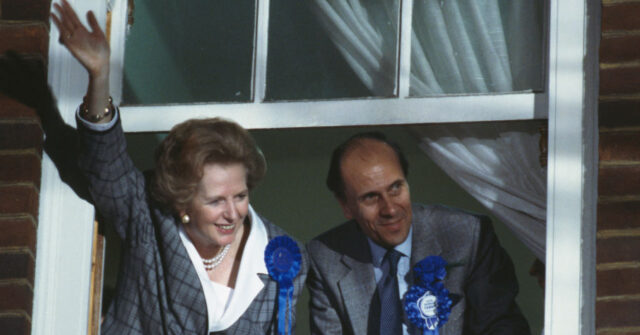Margaret Thatcher’s right-hand-man, hated by the left for being a working class conservative, and gravely injured by the Brighton bombing, Lord Tebbit has passed aged 94.
Norman Tebbit, born in 1931 in London, has died aged 94, his son confirmed on Tuesday. He had been Member of Parliament for Epping and Chingford, an East London – Essex constituency, for 22 years and was subsequently made a life-member of the House of Lords, the UK’s upper Parliamentary chamber, as Lord Tebbit.
The Conservative Party politician had been a major figure during the Margret Thatcher era, and was instrumental in taking on the then-all powerful trade unions, which Thatcher had identified as being one of the key agents in the UK’s economic paralysis. His uncompromising style in this mission earned him the nickname from the left of being a “semi-house trained polecat”.
Lord NormanTebbit, the former chairman of the Conservative Party, speaks on the second day of the Tory conference in Bournemouth. (Photo by Andrew Parsons – PA Images/PA Images via Getty Images)
He was also frequently seen in the light of comments he had made on unemployment, approvingly from the right and with disgust from the left, that rather than rioting, unemployed people should get on a bicycle and look for work.
Tebbit’s humble background saw him become the target for especial vitriol in a Britain where the left considered the working class their property, and class traitors marked out for abuse. Worse of all for the left, he had been a former trade union member and activist during his time as a journalist and air line pilot who went on to “smash” the unions, having seen how damaging they were from the inside.
During the 1980s Tebbit held several cabinet positions and was chairman of the Conservative Party, but possibly most importantly was as emissary of the lower-middle-class Margaret Thatcher to Britain’s small-c conservative working class, who were brought into her electoral coalition after a decade of economic stagnation with Thatcherism’s promise of getting ahead by working hard.
He grew up in a period of British history where social mobility was enhanced by the provision of state-funded, examination-entrance selective schools — grammar schools — which he was able to attend. That early educational attainment put Tebbit in a position where, once called up for mandatory national service, he trained in the Royal Air Force and flew jet fighters.
During that service in 1954 Tebbit narrowly avoided death in a belly-landing jet crash, when he had to smash his way out of the cockpit of a burning Gloster Meteor.
But worse was to come. In 1984, terrorist group the Irish Republican Army (IRA) bombed the Brighton Grand Hotel during the annual Conservative Party Conference hosted at the venue, an attempt to assassinate the British government who were all present in the building at the time. Five people were killed and dozens were injured, the most high-profile of whom was Tebbit.
He and his wife, who had been asleep in their hotel room, were trapped under debris of the partially collapsed building for several hours before they were rescued. Both gravely injured, Tebbit’s wife suffered a broken neck and was confined to a wheelchair for life.
Tebbit remained politically active, as a member of the House of Lords, for decades after the end of Thatcherism. Years ahead of most, he recognised how the new Conservative Party of the David Cameron era was spitting in the eye of many of its own voters and called for an electoral pact with Nigel Farage in 2014.
Stating Conservative and UKIP candidates shouldn’t stand against each other and split the vote in Labour or Liberal marginal seats — advice that was ignored — Tebbit stated at the time “It would help if we didn’t abuse former Tory voters by attacking UKIP as nutters”.
Nigel Farage paid tribute to Tebbit on Tuesday, writing: “Norman gave me a lot of help in my early days as an MEP and was a great man. RIP.”
Kemi Badenoch, the leader of the Conservative Party, led that faction in its memorial to “icon” Tebbit and stated: “his unstinting service in the pursuit of improving our country should be held up as an inspiration to all Conservatives.As a minister in Mrs Thatcher’s administration he was one of the main agents of the transformation of our country”.
She continued: “to many of us it was the stoicism and courage he showed in the face of terrorism which inspired us as he rebuilt his political career after suffering terrible injuries in the Brighton bomb, and cared selflessly for his wife Margaret, who was gravely disabled in the bombing. A reminder that he was first and foremost a family man who always held true to his principles.”
Read the full article here
